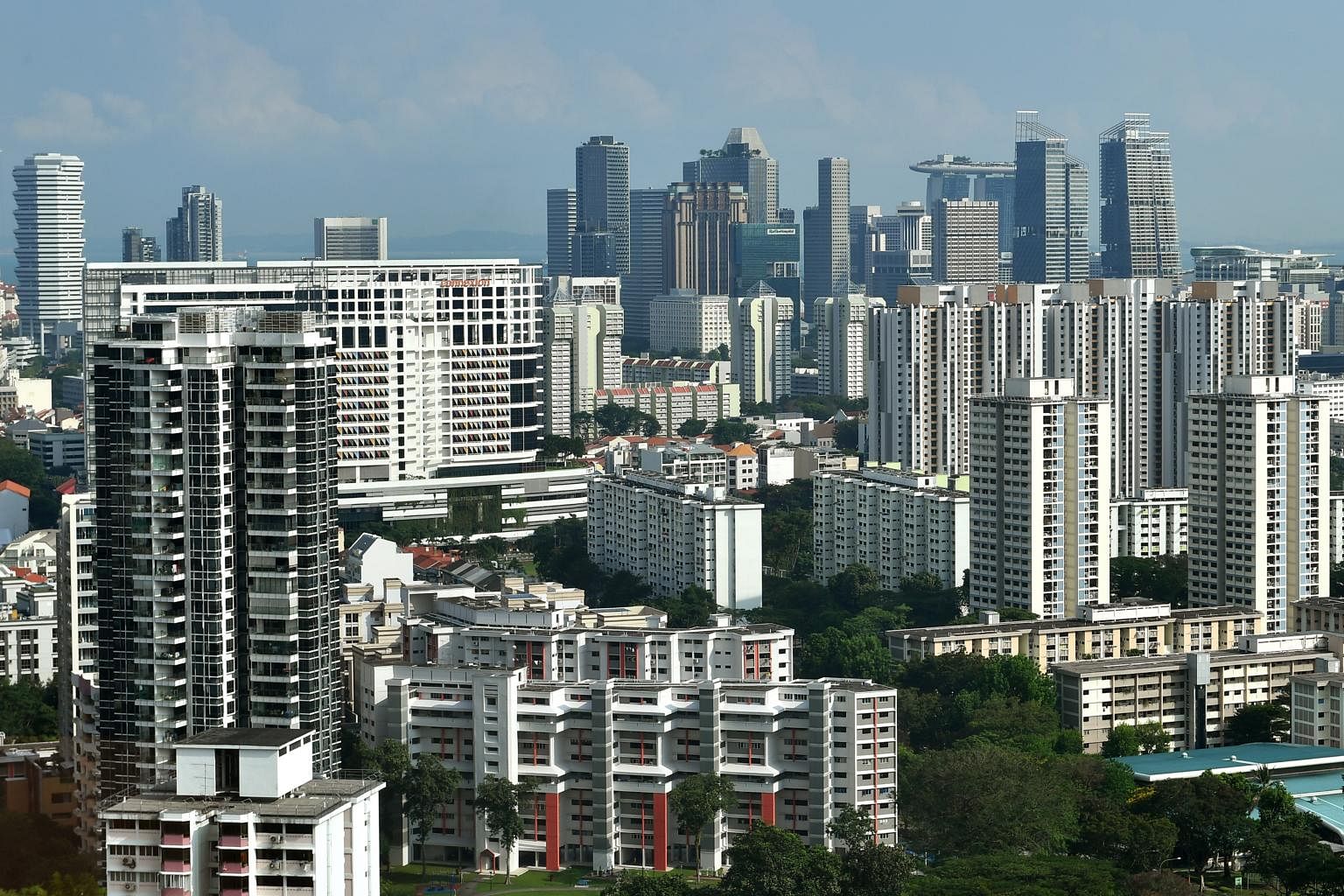Singapore property, bank stocks tumble on hit from new cooling measures
Sign up now: Get ST's newsletters delivered to your inbox

The government's surprise fresh property market cooling measures announcements caused shares in property stocks to fall on July 6, 2018.
ST PHOTO: LIM YAOHUI
Nisha Ramchandani
Follow topic:
SINGAPORE - The fall in property and bank stocks continued on Friday afternoon (July 6) after the government's surprise Thursday evening announcement of fresh property market cooling measures.
At 1.50pm, City Developments had shed 17.04 per cent, or S$1.91, to trade at S$9.30, while UOL Group was down 12.65 per cent, or S$0.98, to S$6.77, recovering slightly from early losses. Developer Oxley Holdings gave up 14.63 per cent, or six Singapore cents, to trade at 35 Singapore cents, with its turnover of 22.39 million shares making it one of the most heavily traded, while CapitaLand was trading at S$3.01, down 17 Singapore cents or 5.35 per cent.
Meanwhile, real estate agency PropNex fell 18.84 per cent, or 13 Singapore cents to 56 Singapore cents and real estate brokerage APAC Realty retreated 21.15 per cent or 16.5 Singapore cents to 61.5 Singapore cents.
PropNex had just made its debut on the Singapore Exchange on Monday, with a per-share IPO price of 65 Singapore cents.
In a note ahead of the market open on Friday, OCBC Investment Research analyst Andy Wong downgraded his rating for the Singapore residential property sector from 'Overweight' to 'Neutral', saying: "Coupled with the current macro uncertainties, near-term sentiment would be highly likely to sour. We expect shares prices of local property developers to see an immediate negative knee-jerk reaction.
"While we previously argued that the positive outlook presented a buying opportunity in the midst of the sector correction, we no longer believe this to be the case. Referencing the previous package of cooling measures introduced in Jan 2013, we note that the FTSE ST Real Estate Holding and Development Index (FSTREH) declined by up to 28 per cent after approximately 37 months (to Feb 2016), with the next day following the announcement closing (down) 3 per cent."
RHB analyst Vijay Natarajan reckons that high-end projects will be affected more heavily by the new measures, which will hit transaction volumes and prices. He said: "We expect a knee-jerk reaction on property sector stocks, with share prices likely to see a 5-10 per cent correction. We are of the view that developers holding large unsold Singapore residential landbank will see a bigger impact."
Mr Natarajan went on to add that that where property agencies are concerned, the impact from a transaction volume slowdown is likely to be partially mitigated by possible increases in developer commissions, owing to the need to sell units within the five-year deadline.
The new cooling measures, which authorities said are aimed at keeping price escalations in line with economic fundamentals, involved adjustments to the Additional Buyer's Stamp Duty (ABSD) rates and Loan-to-Value (LTV) limits on residential property purchases.
The ABSD rates for Singaporeans and permanent residents (PRs) buying their first residential property remain at 0 per cent and 5 per cent respectively, but those buying their second or subsequent home will face a 5 percentage point increase in ABSD.
Foreigners buying any property face a 20 per cent ABSD, up from the current 15 per cent.
Entities buying residential property will also be affected by the new rules. Instead of the current 15 per cent, they will now face a 25 per cent ABSD. In addition, developers buying residential properties for housing development will face an additional, non-remittable ABSD of 5 per cent to be paid upfront upon purchase.
From Friday, loan-to-value (LTV) limits will also be tightened by five percentage points for all housing loans granted by financial institutions. However, they do not apply to loans granted by HDB.
While first-time buyers remain unaffected by the ABSD rules, the new LTV limit at 75 per cent will affect this category of buyers as this means a greater initial cash outlay for their property purchase, said real estate agency CBRE.
"Year to date, 74.4 per cent of all new home sales (3,740 transactions) have been below $1 million. With transaction quantum still relatively affordable, we do not expect buying demand to drop too drastically especially from genuine buyers," it said.
All three local banks were also down sharply on Friday afternoon, with DBS shedding 3.19 per cent or 83 cents to $25.21, UOB falling 3.58 per cent to $26.12 and OCBC falling 2.61 per cent to $11.20.
Analysts warn the three local banks could be impacted by the new cooling measures in the short term, although the long-term view is seen as positive, owing to rising interest rates.
RHB analyst Leng Seng Choon wrote in a note: "Amongst the three banks, UOB has the highest exposure to housing loans, at 27.6 per cent of its total loans - hence, UOB's share price may be impacted more negatively in the short term."
Nonetheless, RHB advised investors to buy into banks on weakness to ride on the trend of widening net interest margins, singling out UOB as a top pick on a one-year time frame.
In a report on Singapore bank stocks, OCBC Investment Research's Carmen Lee noted that while the latest measures will not hurt the current mortgage portfolio for the three banks, new loans growth could come off in line with the slowdown in property transactions in the coming quarters.
She added: "We are still fairly positive about the other revenue contributors for the banks, but we expect this headwind to be a dampener on short term share price performance. For longer term investors, short term price weakness could present a good opportunity to gradually buy into banking stocks."

